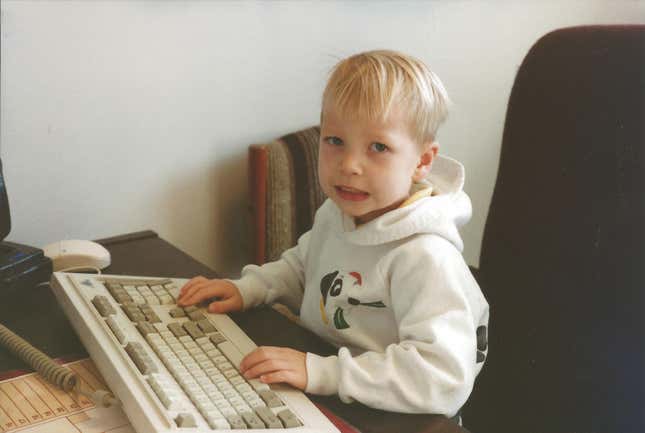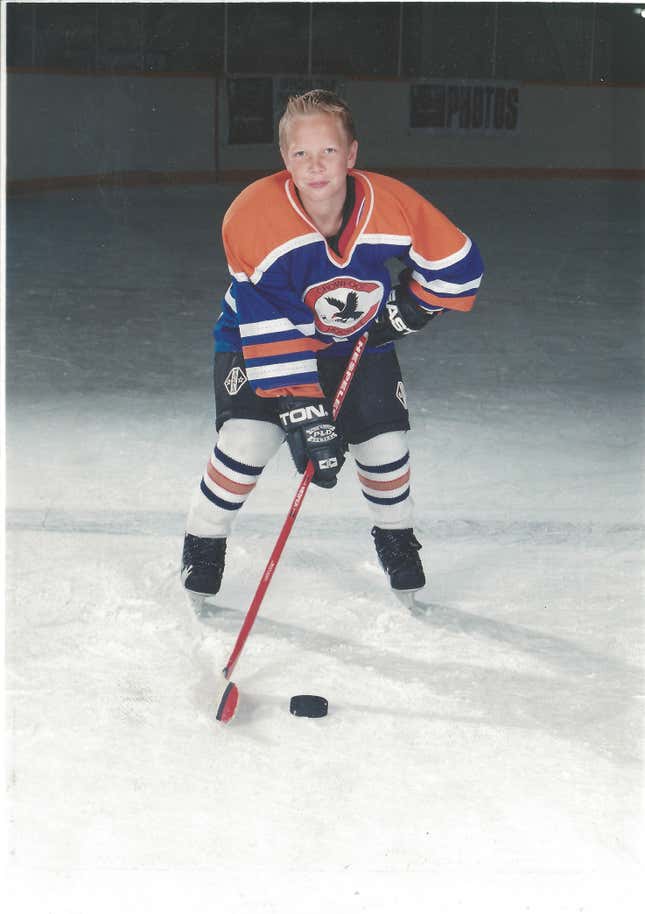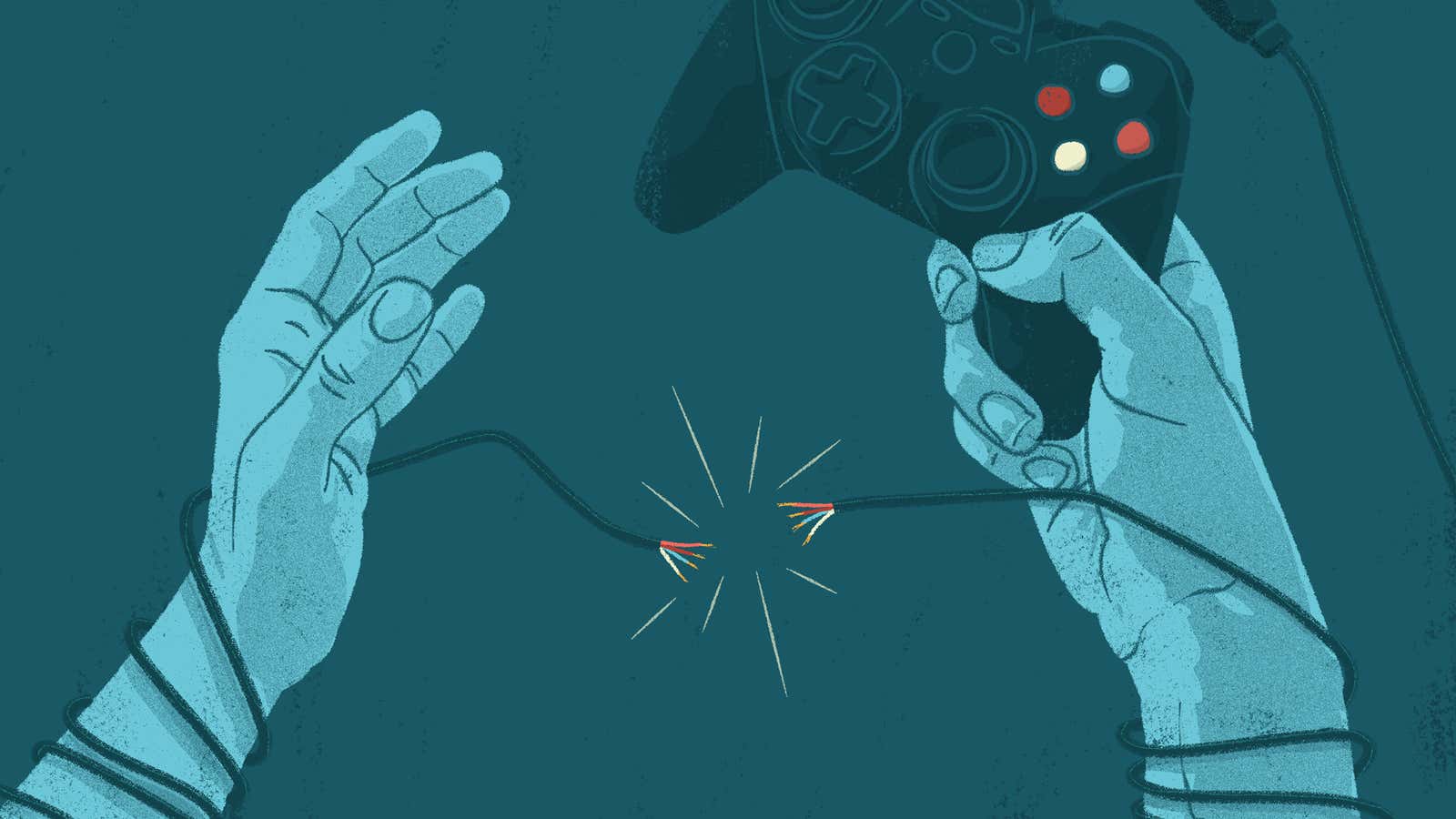When one of World of Warcraft’s top ten guilds recruited Cam as their chief hunter, his suicidal thoughts surged. To earn the enviable invitation, Cam had spent 16 hours a day grinding on WoW, to the detriment of everything else. He told his father he’d scored a job at a local restaurant, but every day after his dad dropped him off at the McDonald’s across the street, Cam would hop the first bus home and log back on. There was no job. There would be no paycheck. Cam’s only obligation was to his night elf hunter, and it was an all-consuming commitment.
What if I just ended it? Shortly after transferring WoW servers, Cam wrote a final note to his parents. On a phone call with Kotaku, Cam recalled how his mother had made Swiss chard soup that night. Upstairs, sobbing over a warm bowl, he strategized a suicide plan. Mid-thought, his phone buzzed: Cam’s only friend invited him to see the movie Superbad. Fuck it. In his buddy’s car before the movie, they smoked enough weed to cloud the windows grey with smoke. Superbad was hilarious. Wave after wave of laughter came over Cam. After the movie, he realized that he was a danger to himself.
Today, Cam has been sober from gaming for seven and a half years. For him, it was a problem that insinuated itself into every corner of his life over the course of his adolescence. “Gaming fulfills all of my needs in one thing,” Cam explained. He earned rewards consistently. Benchmarks for success were clear, tangible. He got his social interaction. Structure. It helped him forget about how he had dropped out of high school, lost friends, got too out of shape for hockey. Or his bullies, his deteriorating family life, his pretend jobs. He had an identity. Unambiguously to him, the word “addiction” explains his relationship to games: obsession, withdrawal, compulsion, lying, a total shift of values.
It’s clear that some minority of game players, like Cam, have found themselves gaming so compulsively that they neglect the rest of their lives—and can’t get themselves to stop. But what they, and experts, disagree on is whether or not that constitutes an “addiction” to games, whether games are “addictive” and whether the excessive gaming is just a symptom of a deeper issue. The addition of “gaming disorder” to the World Health Organization’s International Classification of Diseases this year has spurred contentious debate on all sides of the issue.
Until recently, it was controversial to apply the word “addiction” to a behavior. Addiction was a term reserved for heroin, crack, cocaine—tangible things the body screamed out for. Substance addiction makes sense; behavioral addictions, psychologists argued, were fuzzier. Nicotine is addictive at its core: Smoke too much, and you’ll risk craving cigarettes, feeling volatile without a smoke, struggling to stop, even while knowing the health repercussions. But when the vast majority of players can enjoy Fortnite long-term without suffering a major blow to their quality of life, is “gaming addiction” a legitimate problem?

In the 1980s, poker fiends in chronic debt—whose lives suffered because they couldn’t stop—became diagnosable. They had a gambling compulsion, an impulse-control issue. It wasn’t until 2013 that the Diagnostic and Statistical Manual of Mental Disorders reclassified gambling addiction as “gambling disorder” in its new behavioral addictions category. It was the first non-substance-based addiction disorder officially recognized by the DSM. “Research to date shows that pathological gamblers and drug addicts share many of the same genetic predispositions for impulsivity and reward seeking,” wrote Scientific American magazine shortly afterwards. “Just as substance addicts require increasingly strong hits to get high, compulsive gamblers pursue ever riskier ventures. Likewise, both drug addicts and problem gamblers endure symptoms of withdrawal when separated from the chemical or thrill they desire.”
The recognition of gambling disorder paved the way for the World Health Organization’s contentious new “gaming disorder.” Announced late last year and confirmed last month, the classification of gaming disorder instantly piqued the interest of overbearing parents whose children’s after-school Fortnite hobby often wins out over homework. Among lots of gamers, it’s piqued the ire of enthusiasts who say their hobby is already stigmatized enough. While “gaming disorder” might be a real problem for a small subset of gamers and therefore worthy of recognition, nobody wants their parents sending them to a psychiatrist just because they put 100 hours into Xenoblade Chronicles 2, either.
Gaming disorder is flypaper for ideologues on all sides of the conversation. It doesn’t help that the definition has been vague. At one point, researchers diagnosed gaming disorder using 18 different methods, producing prevalence rates between 0% and 45%. Now, according to the WHO, gaming disorder is “characterized by impaired control over gaming, increasing priority given to gaming over other activities to the extent that gaming takes precedence over other interests and daily activities, and continuation or escalation of gaming despite the occurrence of negative consequences.” The WHO adds that, to fit the bill, a gamer’s habits have to impact their social, educational, and occupational lives for about a year. In practice, that can look like a lot of things. And since most AAA games these days are designed to be seductive time-sinks, gamers, non-gamers and psychologists alike are debating whether gaming disorder is even worth recognizing.
Experts on the psychology of gaming have themselves warned of a “moral panic” around gaming addiction, in one paper arguing that it “continues to risk pathologizing normal behaviors,” adding, “video game addiction might be a real thing, but it is not the epidemic that some have made it out to be.” (A recent metaanalysis including 19,000 subjects concluded that less than only about 3% of game-players are at risk.)
Gaming disorder’s medical approval has fed valuable fodder to the parental thinkpiece economy. A cursory Google search dredges up dozens upon dozens of worried parents’ published missives in the Times, the Chicago Tribune, the Guardian, or Mashable. Kids who play more than a couple hours of Fortnite, the hottest game du jour, are squirming under new parental scrutiny. Does 20 hours of gaming a week constitute an addiction, as the BBC seemed to claim, or at least heavily imply, last month?
What recovered gaming addicts interviewed by Kotaku say is that addiction is defined much differently than the sheer number of hours you put into a hobby. It means everything else is eclipsed by the need to 100% a level. It means not being able to hit “log off,” even though tomorrow is your son’s graduation. It means not much else feels good. Cutting through the ideologies and fears around gaming disorder are real people whose stories about compulsively gaming weigh against the papers, blogs, forum posts and manual entries. What about the people who fit the WHO’s bill?
Benjamin*, who’s been sober from games for three years, told me, “Maybe if I wasn’t exposed to games, I would have become a drug addict.” As a teen hiding out in his room, he couldn’t get himself to stop gaming before 3 a.m, sometimes slipping until 5 a.m., when he’d hear his mother get up for work. Then, he’d rush into bed and pretend to sleep. Benjamin couldn’t stop playing—not when he failed out of college three times, not when he lost his spot on the wrestling team he’d dreamed of being on.
One day, when he was still at school, he asked a frat brother to lock away his gaming mouse until midterms were over. He’d been gaming for several days straight and thought cutting himself off might help him focus. Days later, Benjamin “picked him up by the scruff of his shirt and threw him against a wall” to get his mouse back.

When I asked whether Benjamin blamed games for his gaming addiction, he offered a stern “No.” He played every type of game he could get his hands on except sports and puzzle games, so it wasn’t a particular mechanic that hooked him, he said. “Pretty much any way of getting the fuck out of life—that’s what I wanted,” he told me. “I wanted to be anyone but me. I wanted to be anywhere but here. I wanted it to be any time but now.” Benjamin added that he often overindulged in drinking and pornography, too. And, after spending some time in therapy, he’s finally addressed some of what made him feel the need to “get the fuck out”: family issues, anxiety, depression.
Most recovered gaming addicts Kotaku interviewed attested that video games were far from the root of their problems. “I think excessive gaming is almost always a symptom of an underlying condition,” said Harold*, who was addicted to World of Warcraft and attended several clinics for treatment. For him, and three other sources, that underlying condition was depression.
Several other sources interviewed had suffered from other addictions prior to gaming. Scott J. was, in his words, an “out of control” drinker until he was 23, when he joined an Alcoholics Anonymous fellowship. Soon after, he told me, “I started playing a lot of video games, having never heard of video game addiction.” Scott is loath to mention what games he compulsively played, arguing that the nature of the activity doesn’t matter when he’s talking about the bigger issue of a general addiction disorder.
“It’s perfectly clear to me that I have one condition that involves all these things: obsessive compulsive, denial, hiding, lying about it, the fears, the crazy thinking, the irritability if I’m staying away, the mental cravings and urges, the distorted thinking,” he said. “In my 20s, I tried to numb it out with drinking. In my 30s, I numbed out with gaming. The idea that they’re two different conditions doesn’t make any sense. It doesn’t match my experience at all.”
Curiously, a lot of sources who believe their gaming addiction stems from mental health conditions like depression or anxiety were unhappy about the WHO’s “gaming disorder” classification. Why should a therapist focus on gaming obsessively when that can be a symptom of something deeper? Or another way to “numb out” of life, in Scott’s words? Sure, staying away from games helped gaming addicts glean some perspective on their habits and where their compulsions came from—but quitting games wasn’t the be-all, end-all solution to pushing “reset” on an addict’s life, sources say.
Hartmut*, who went “cold turkey” after spending all his time trying to hit the Diamond rank in Overwatch, says his initial optimism about “gaming disorder” has turned into fear. “I’ve actually come to think about the WHO draft as being dangerous,” he told me over email. “If gaming disorder was officially recognized, people would get diagnosed for a mainly behavioral issue, which in turn most likely originated in an underlying, deeper mental health issue (like, in my case, depression). Those ‘root’ issues could easily be overlooked.”
Although recovered addicts agreed that addressing root causes for gaming addiction is key, Dr. Douglas Gentile, psychologist and Iowa State University’s Media Research Lab head, has another perspective. In 1999, Dr. Gentile began researching gaming addiction “largely trying to show that it was wrong,” he told me for a 2015 article on the topic. Instead, he was converted. Over the phone last year, he told me that, after surveying thousands of subjects, “We found that gaming precedes the depression if they’re damming enough areas of their life where it counts as a disorder.” He describes it as a chicken-or-egg scenario: Sure, lots of problematic gamers are diagnosed with other conditions. If a person spends too much time cooped up on their own with any activity, it could stunt their social skills so, when they do go out in public, they’re anxious as hell. It can mean being so isolated, gamers lose the ability to cope with life. That can help spur its own problems.
It’s difficult to find lifelong gamers—people who operated under the gamer identity for decades—who attribute the root cause of their troubles to video games. Four sources adamantly stated they love games—they just can’t play them anymore. A few, however, noted that their games of choice hinged on gambling-like mechanics: loot boxes and the like. Hartmut, who was seeing a therapist to help with his depression, would roll over in bed to grind on any of the free-to-play games installed on his phone—Clash Royale, Hearthstone, Fire Emblem Heroes—“each of them psychologically made so that you have a progression loop, get dopamine boosts by getting a super rare and shiny item, and get daily rewards so you check in more often,” he said.
“In most cases, understandably, they are also designed so that later ‘expansions’ gradually introduce stronger cards/characters/gear/skins to the game, maybe even just for a limited time - just to get you into buying stuff,” he continued. “Had I not uninstalled Fire Emblem Heroes (my favorite franchise of all time, has me emotionally attached because of nostalgia), I would be a poor man now.”
Over the last year, there’s been a muscular, widespread pushback against loot boxes, even from legislators, citing their gambling-like properties. Compulsively playing, say, first-person shooter Call of Duty is a little different from getting hooked onto Clash Royale’s dopamine loop. Yet, scrolling through stories on gaming sites (yes, like Kotaku) and subreddits and forums, there’s immense skepticism in the gaming community around gaming disorder, and even a certain strain of defensiveness. Cam, who now runs GameQuitters, the largest online support group for video game addiction, told me that’s probably because of a lasting stigma from the violent-games moral panic of the 1990s, when parents and governments were concerned that playing GoldenEye would turn kids into killers.
“Whenever there’s a conversation around gaming there’s a natural defensiveness that’s extremely high,” Cam told me. Some people don’t like hearing the idea that others might want to stop gaming. Every couple of weeks, Cam receives hate mail, harassment or death threats because he runs GameQuitters. Six months ago, someone told him he should walk off a pier with cement tied to his shoes. Sometimes, he says, when the public conversation around gaming addiction resurfaces, the subreddit he moderates, /r/StopGaming, is raided by mobs of trolls.
“All the threads were people screaming at and harassing us. I can handle that. It doesn’t get to me. I understand it,” said Cam. However, he said, it can impact people on /r/StopGaming whose entire lives and identities have been tied to gaming for as far back as they remember; it can further alienate them, make them feel guilty for seeking help. “The 13 or 14-year-old in the Reddit community who feels vulnerable, just quit gaming, he’s feeling like he’s no longer part of his community and all these people come and say they’re embarrassing and their addiction is not real—people read that and feel ostracized,” he said.
The main upside to the official classification of gaming disorder is that it might help some people get their lives back in order. It can be a buoy for gamers who can’t figure out why their friends are okay putting down the PlayStation 4 controller after only two hours, while they have to keep going. “I thought that to be an addict you needed to have a needle in your arm, be lying under a bridge, or be drinking from a paper bag,” said Benjamin. He eventually sought help for his addiction after moving back in with his parents. He’d been seeing therapists since he was seven, but none had ever diagnosed his gaming addiction. He’d never heard of that himself. One source, Jacob, said that when he sought help for his gaming addiction, a professional addictions counselor told him that the real issue was that he was forgoing social connection. Offline games were the issue, said the counselor. He should game online. So Jacob binged on Starcraft 2. The problem got worse. Without proper guidelines, professionals didn’t take him seriously. They might today.
Online, Benjamin and Jacob began attending text and voice meetings with other recovering gaming addicts. Now, they help lead Computer Gaming Addicts Anonymous, a grassroots 12-step group for gaming addicts. “I’m just trying to let people who have a problem know they they can get help,” he said. CGAA’s recovery program sets boundaries for hundreds of problematic gamers. Like Alcoholics Anonymous, its members teach gamers that games aren’t the sole problem; their mental health is. However, abstinence is the only way for gaming addicts to uncover the roots of their self-destructive behavior. It’s a philosophy widely shared among the recovered gaming addicts I interviewed.
Cam’s new hobby is surfing, which, he said with a laugh, he simply can’t do for 15 hours a day. Progress isn’t as measurable as in WoW. Rewards, like catching a good wave, aren’t consistent. “Yesterday, when I went surfing, I caught a wave. I was fully immersed in that moment. I wasn’t able to focus on anything else,” he said. But the crucial thing, he added, is that when he surfs, he always has to come back.
*Asterisks indicate names changed to protect anonymity.
Update, 12:52 PM: An earlier version of this story said Cam’s human hunter in World of Warcraft was level 70. That is incorrect and we have updated the article. Additionally, a portion of this story that discussed suicide has been slightly edited since its original publication. If you or someone you know is contemplating suicide, please call the National Suicide Prevention Lifeline at 800-273-TALK (8255).
